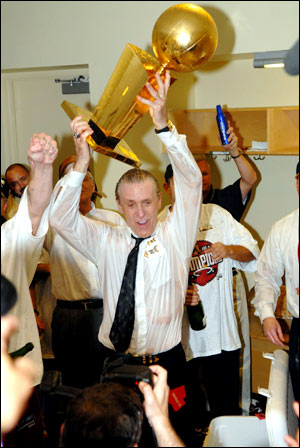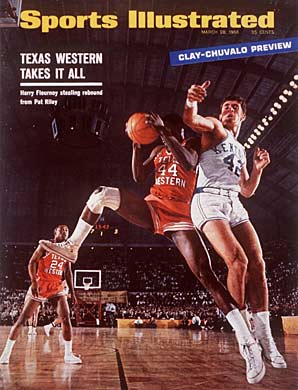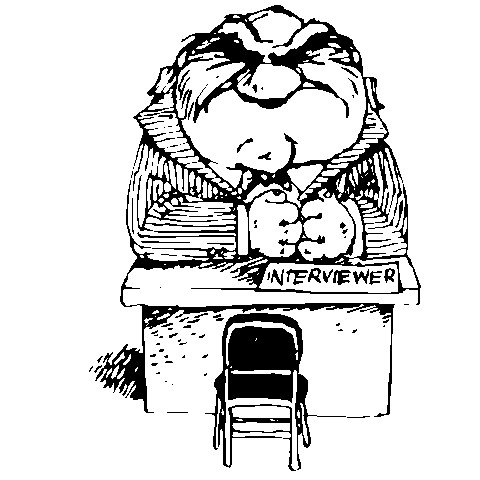How do you avoid complacency in a team setting?

RILEY: First of all, you have to realize that complacency is a way of life. You don’t ever avoid it. You have to alert your players to the fact that there are so many things that can get between them and what you are trying to teach them.
You can’t become distracted and let all of these things get into the way and take your mind off of the prize. It’s a deadly disease because it simply gets in the way of your energy and your effort. And when your energy and your effort are down, your efficiency is going to be down.
(Interview questions and answers taken directly from the February 2007 edition of Scholastic Coach & Athletic Director)
Topics:
basketball performance,
basketball resources,
basketball training programs,
athletic training,
Ownership,
Pat Riley,
discipline,
customer service,
development,
Leadership
How important is it to relate to individual players and how can a coach improve his or her interpersonal skills?

RILEY: It depends on what level you are coaching. When it comes to coaching on a youth level, in a junior high school level, or a high school level, where kids are still maturing emotionally, physically, mentally, and spiritually, I think the communication, talking, educating type of approach transcends the actual X’s and O’s. I think you have to develop the mind and the will as much as you develop them on the court.
As players get older, especially as professionals, they will bring the philosophies of five to fifteen coaches with them. That means they have been talked to, they have been coached by a lot of different people, they have been motivated and inspired, and they know what it’s like to be a player who is being coached. Sometimes in professional basketball, saying less is best. Your actions and how they work and what you put in front of them every day will be noticed.
If I were coaching a high school team, I would be teaching, teaching, teaching, and teaching verbally every single day to every single individual.
(Interview questions and answers taken directly from the February 2007 edition of Scholastic Coach & Athletic Director)
Topics:
basketball performance,
basketball resources,
basketball videos,
Pat Riley,
discipline,
development
Your award-winning motivational video, Teamwork, applies winning philsophies to business and life in general. What is your definition of teamwork as it applies to sports?

RILEY: Teamwork is the essence of life. And teamwork is an interactive relationship, whereby all of us are either hired or brought together for whatever reason to get a result. It is the essence of life in family. It is the essence of life in sports. And it is the essence of life in business. In order to be successful as a group of people the dynamics of being a team are all the same, with the exception that you are jumping off a different platform – probably from a different industry. But really, the principles are the saem. People have to come together for the common good.
The only way you are ever going to do that is through trust. It’s even more than belief. Belief just isn’t enough. You simply have to get to a point where you trust one another – in their motives, in their approaches, in their games, in their idiosyncrasies, and their personalities, and what they bring to the table – not be judgmental as a coach, or a teacher, or a parent. No student, no player, no child will ever let you coach, parent, or teach them unless they trust that you are absolutely sincere, competent, and reliable. They are smart enough to see that. If your intentions as a coach or a teacher or a parent are nothing less than sincere, because you want to get something out of it yourself instead of what’s in the best interest of the person, then they won’t let you. They will sort of punch the clock with you.
You have to be competent because they want to learn. Most kids and most players simply want to learn and get better. And so you have to know what you’re doing. It’s the same thing when it comes to reliability. If they know you’re going to be there, then the trust and the fact that teamwork can cross over from sports into real life will be there, too.
(Interview questions and answers taken directly from the February 2007 edition of Scholastic Coach & Athletic Director)
Topics:
basketball performance,
basketball resources,
Pat Riley,
discipline,
development,
Leadership

They say it’s not what you know, but who you know.
They’re right. But take it a step further; it’s not WHO you know, but HOW you know someone.
It’s easy to meet someone at a conference, send them a LinkedIN connection and, voila, that person is permanently in your network. But I recently went through my LinkedIN “network” and realized I don’t even know who some of those people really are. What kind of network is that??? The same holds true for Facebook: How many of your “friends” do you consider your friends in real life?
Social networks like LinkedIN and Facebook are simple and often fake. Real networks take time to cultivate and develop. Shoot an email to someone when their team or school is in the news. Pick up the phone to ask for advice. Send a note if a somebody loses a loved one. A real network is about people looking out for one another.
So when that dream job finally opens up at that company you’ve always wanted to work for, a good networker will pick up the phone and feel comfortable calling to ask for that recommendation. A great networker, meanwhile, doesn’t need to call because that person on the other end already knows who you are and what you’re capable of.
Mark Harris
Associate Director, Athletics Annual Giving
Loyola University Maryland
Topics:
basketball resources,
Good to Great,
customer service,
everything basketball,
development,
networking

A friend of mine recently left his job at a major academic institution where he worked his way up from the ground floor into a middle management position before leaving for the upper ranks at a competitor’s on the west coast. As a courtesy to the organization in which he had given so much, and so much given to him, he approached his superior's administrative assistant and asked if there was a formal “exit interview” that he was to partake in prior to his final day at the end of the week.
“Usually only people that want to complain ask for exit interviews,” the administrative assistant explained, “did you still want to speak with him?”
“ummm, well, no, not anymore,” my friend replied.
Wouldn’t an exit interview be the perfect opportunity to gain feedback into your organization’s weaknesses, customer service, and operating procedures?
Sure the employee may be salty that they are leaving, but what chance for feedback do you have otherwise once they’ve walked out the door?
You should search out that employee and simply ask, “what can we do better?” This is the only time they won’t be afraid to tell you exactly how it is. You can sift through the salt and substance after, but once they’re gone, they’re gone, and hence so is the opportunity for your organization to improve.
Art Horne is the Coordinator of Care and Strength & Conditioning Coach for the Men’s Basketball Team at Northeastern University, Boston MA. He can be reached at a.horne@neu.edu.
Topics:
Art Horne,
basketball resources,
Ownership,
Good to Great,
discipline,
customer service,
everything basketball,
development,
managing

We’ve all done this at one time or another; walk into a weight room, watch an athlete train, and know exactly who their strength coach was or what strength coach programmed their training.
Whether you know Tony Testa, Director of Sports Medicine at Seton Hall or not, you’d know exactly which kids he taught the Olympic lifts to and which ones he didn’t. Tony is a perfectionist and a first rate teacher of the Olympic lifts, in fact, probably the best I’ve ever seen. Whether he was helping out in the weight room during training or implementing the clean as part of his rehabilitation program, his athletes are a direct reflection of his affection for the Olympic lifts.
With other strength coaches, its bench press Mondays. 10 sets of Bench… doesn’t matter if you have time for anything else.
“I’ve competed in bench press competitions so you’ll bench too.”
On the flip side, you’ll find other “performance coaches” with little actual training experience avoid weights all together.
“It’s all about flexibility. Feel the stretch”
So what exercises are your athletes performing today, or should I say, which ones are they not doing simply because you don’t perform them yourself? Are you looking to fill in the gaps or just simply looking to fill time?
Art Horne is the Coordinator of Care and Strength & Conditioning Coach for the Men’s Basketball Team at Northeastern University, Boston MA. He can be reached at a.horne@neu.edu.
Topics:
Art Horne,
basketball resources,
Strength & Conditioning,
hockey conference,
Ownership,
development,
Leadership

A business friend of mine is always talking about gaps in the market and turning a profit. Always looking to fill only those gaps that have a market and thus place only resources where they are best utilized. In discussing our department and without knowing anything about Sports Performance, the first question he asked me was this,
“Is there a gap in the market? And is there a market in the gap?”
A classic example of a gap in the market was the introduction of the Segway. At the time, and still to this day, there was no machine that enabled a person to stand upright and zip around at a running speed with little or no effort. A clear example of a gap in the market.
The problem that the makers of the Segway ran into was that they never followed up the first question with the second and asked themselves, “Is there a market in the gap?”
Besides a few mall rent-a-cops, the Segway basically was a flop – no market in the gap despite the massive gap in the market.
If you follow the NBA, you’ve no doubt heard the story of Kevin Durant’s failed bench press attempt at the NBA combine his rookie year. Kevin Durant can’t bench 185 lbs; some would say a clear a gap in his physique (market). What many failed to see though, was that there was absolutely no need to fill this gap in Kevin’s physique. Developing Kevin’s physique so that he could bench press 225 lbs, although fulfilling your ego, will not make him play any better… and hence no market in that gap. When examining your athletes both in rehab and performance the question we need to ask when addressing these programs is simple.
Is there a market in their gap? And if not, we need to start putting our resources into gaps that are marketable.
Art Horne is the Coordinator of Care and Strength & Conditioning Coach for the Men’s Basketball Team at Northeastern University, Boston MA. He can be reached at a.horne@neu.edu.
Topics:
basketball resources,
athletic training,
Strength & Conditioning,
Ownership,
Kevin Durant,
discipline,
development,
Leadership,
managing
Everyone’s entitled to their own opinion but not their own facts.
When meetings boil down to people’s opinions, I usually have to leave. I know that we are each entitled to our own opinion. I get that.
But don’t confuse your opinion with facts.
“Well, I feel this would be the best solution…”
Did you look at the distributor? Is there a cheaper way to get the same product? What about the warranty? How does it fit into our business model or fit our core principles? Is there evidence based literature that supports its use and price tag? Will it serve a large group or can it only be used by one individual at a time?
Facts take time to investigate. They take energy and a “superdisciplined” approach. Opinions are like talk at the barbershop.
I’ll take an order of more facts please.
Art Horne is the Coordinator of Care and Strength & Conditioning Coach for the Men’s Basketball Team at Northeastern University, Boston MA. He can be reached at a.horne@neu.edu.
Topics:
basketball resources,
athletic training conference,
athletic training,
Strength & Conditioning,
Ownership,
Good to Great,
discipline,
customer service,
development,
Leadership,
managing
Sometimes it feels like we have so much to do, so many little fires to put out, so many tasks to accomplish in so little time that we forget we are running around with scissors. Although this may not be literally speaking, the fact is that running with scissors, at least as my mom always told me, was dangerous.
Instead of running around with scissors in your hand, pass them off to someone that should actually be doing the trimming. You see, when you’re doing the job that other people were suppose to do, you’re wasting your time as well as theirs. When you do other people’s jobs you are actually making your organization worse.
Your job as a leader is to ask tough questions and challenge the scope of your job and the jobs of those around you.
Don’t confuse activities with accomplishments.
Now put down the scissors.
Art Horne is the Coordinator of Care and Strength & Conditioning Coach for the Men’s Basketball Team at Northeastern University, Boston MA. He can be reached at a.horne@neu.edu.
Topics:
Strength Training,
basketball resources,
athletic training conference,
Ownership,
Good to Great,
discipline,
athletic trainer,
customer service,
development,
managing
I had a manager from another company give me a call recently for a reference on a employee that worked for me several years ago. He explained a little about the position and then I in turn told him a little about the employee's responsibilities here and how this particular person fit in with the group. When I was done, he asked me how this employee stood out from the rest. Great question. My answer was immediate and without hesitation; they were one of my top students because they took ownership of their position.
What is ownership exactly? It's the difference between someone who does the minimum of what is expected of them and someone that takes a legitimate interest in improving their workplace. Let's take the Ownership Quiz . . .
* During staff meetings, are you the person who volunteers for new tasks/projects or are you the person who lowers their eyes hoping someone else raises their hand?
* Do you take pride in the work you do on a day to day basis or do you simply do what is asked of you and be glad it's done?
* Do you take the initiative, bringing ideas for positive change to your office or are you the person that simply complains about how things could be better?
* If there is an issue outside of business hours, do your coworkers know it's alright to contact you or are they under the impression that would be a cardinal sin?
* Do you subscribe more to the idea of getting your job done rather than the phrase "business hours" or are you punching a clock at 9a and 5p every single day?
What if your well-being was tied directly into the performance of your whole office? Well, I've got news for you. It is. Ownership is about treating your position as if you owned your own business. It is about being a catalyst for positive growth in your environment regardless of whether you are the VP or an entry-level employee. When you own your position, you are telling your supervisors, your co-workers, and the employees under you that you care. You are providing a positive example for all and working towards bettering your environment regardless of the situation. The highest compliment that I can give to any of my employees is that they took ownership of their position. These are the ones that stood and continue to stand out from the crowd, even years later.
Are you taking ownership of your workplace or just getting in the way of those that do?
Shaun Bossio is the Assistant Business Manager and ProShop Manager at Boston University FitRec.
He can be reached at sbossio@bu.edu
Topics:
basketball resources,
basketball training programs,
athletic training conference,
boston hockey summit,
athletic training,
Ownership,
Good to Great,
discipline,
athletic trainer,
customer service,
everything basketball,
development,
managing,
Announcements









